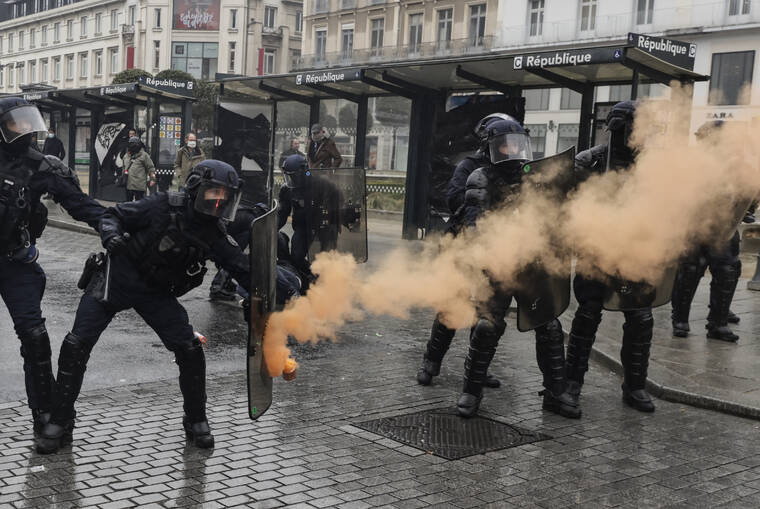Macron wants French pension plan implemented by end of year
PARIS — President Emmanuel Macron is stubbornly resisting growing discontent on the streets of France, saying on Wednesday that the pension bill he pushed through without a vote in parliament to raise the retirement age from 62 to 64 must be implemented by the end of the year.
After his interview broadcast on national television, critics attacked Macron, describing him as “self-satisfied,” “out of touch” and “offensive.”
Some suggested that the president is playing with fire amid strikes and daily demonstrations, some leading to clashes with police. Unions have called for nationwide protests on Thursday that are likely to further raise tensions.
“He is in absolute denial,” said Olivier Faure, the head of the Socialist Party. It’s as though “there’s a well lit fire and he is pouring jerrycans of gas on the flames.”
The president’s remarks Wednesday were his first since the government finally forced the pension bill through parliament last week, then survived two no-confidence votes in the lower chamber of parliament Monday.
France’s Constitutional Council will review the bill in the coming weeks, and it can only be turned into law after the body gives its approval.
Prime Minister Elisabeth Borne has taken the brunt of the opposition’s fury during often nasty parliamentary debates, but Macron said in his interview Wednesday that he “trusts” her to continue leading the government and suggested that he is not planning a government reshuffle.
The 45-year-old centrist president, in his second and final term, repeatedly said he was convinced that France’s retirement system needed to be modified to keep it financed.
“That reform is not a luxury, it is not fun. It’s a necessity for the country,” he said, while conceding that “we must listen to (its opponents), listen to their anger and respond to it.”
As he spoke, dockers in Marseille, garbage workers in Paris striking for a 17th day and energy workers at a Normandy refinery were among those refusing to work and setting up blockades.
A partial disruption of fuel shipments due to blocked refineries in Normandy and southern France led to shortages at gas stations, notably in the southeast, while rubbish piled up in Paris despite a police order to provide at least a minimum level of service.
In the Brittany city of Rennes, a protest by fishermen angry at rising fuel prices and an EU draft plan to ban weighted nets that sweep the seabed turned into a violent confrontation as groups protesting the retirement reform joined in. Police fired tear gas and water cannons to disperse rioters burning garbage and throwing flares. At one point, protesters drove a tractor into the mayhem.
As a protest in northern Paris degenerated, riot police surged forward, trying to corral rowdy demonstrators down a side street.
Two Associated Press journalists at the scene withdrew to let police pass, but officers used their shields to slam the journalists against the wall, pinning them there despite their clear identification as members of the media.
The unusually muscular action comes amid growing tensions between police and radical protesters in recent days, after two months of largely peaceful demonstrations. Some journalists say they are being increasingly targeted, by police as well as by some protesters.
Macron made a distinction in his interview between the union-organized protests he views as legitimate and the small, mobile groups setting fire to garbage bags and bins that end in confrontations with police.
To make his point, the president evoked rioters storming the U.S. Capitol in 2021 and Brazil’s top government buildings earlier this year, as well as the yellow vest movement against social injustice in France in 2018 which led to violent clashes and vandalism in Paris streets.
“When the United States of America lived what they lived at the Capitol, when Brazil lived what it lived, when you have seen extreme violence in Germany, the Netherlands, or sometimes here at home in the past … we must say that we do respect (peaceful protesters), we do listen, we’re trying to move the country forward … but we cannot accept factious people nor factions,” he said.
Unions, opposition politicians and other opponents insist they want the retirement measure withdrawn.
Workers blocking a waste management plant in Issy-les-Moulineaux on the southern edge of Paris watched the president’s interview with disappointment.
“We will carry on the resistance,” Frédéric Probel, local leader of the leftist CGT union, said in an interview with the Associated Press. “It’s not that (workers) don’t want to work,” he said, adding, “So what is the message? We must resist.”
Macron acknowledged that a majority of the French are opposed to the reform. “But between opinion polls and the general interest of the country, I’m choosing the general interest … And if it means bearing unpopularity afterwards, I will bear it.”
———
Associated Press writers Helena Alves and Nicolas Garriga in Paris, Alex Turnbull in Issy-les-Moulineaux and Jeremias Gonzalez in Rennes contributed to this report.

